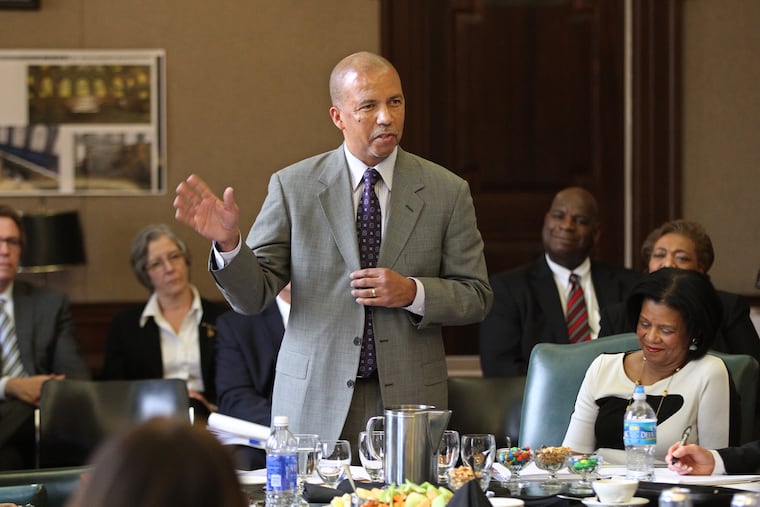Colleges in the Philly area and elsewhere are pledging to address national unrest and criminal justice inequalities
Now largely shuttered due to the pandemic, colleges are looking for other ways to address racism and the unrest gripping the nation following the death of George Floyd at the hands of police officers in Minneapolis.

College campuses for decades have been a venue for demonstrations against inequality, a place to push for change and justice.
Now largely shuttered due to the coronavirus pandemic, they are looking for other ways to address racism and the unrest gripping the nation following the death of George Floyd after a Minneapolis police officer knelt on his neck.
Two area colleges Thursday began the effort by holding virtual forums. At Community College of Philadelphia, educators and community activists discussed inequities in the criminal justice system, institutional racism, and the need to find solutions.
“The importance of beginning the conversation and the dialogue in the current context is something that needed to happen and needed to take precedence over everything else we had planned in our lives,” CCP president Donald Guy Generals said during the 75-minute forum.
Drawing about 500 viewers, the forum looked at police brutality and the roles of whites and blacks in addressing the problem. There was pessimism about the ability for police to reform, and yet hope for America to improve.
» READ MORE: From Thursday: A sixth night of curfews
“I still believe after all of this that America can work,” said the Rev. Alyn E. Waller, senior pastor of Enon Tabernacle Baptist Church. “But that means we have to get involved. ... These systems that are unjust will only change as we get in there and change them."
Later, Rowan University in New Jersey began a series with a goal to find solutions "that could help resolve racially charged issues — in particular the treatment of blacks by some police — that continue to roil America,” the school said.
Elsewhere, campus leaders issued statements of concern and support and promised to consider what can be done better. At Haverford College, president Wendy Raymond has called on the campus "to join our students, faculty, staff, and alumni who already actively practice anti-racism, recognizing that the goal of anti-racism sits firmly in the educational mission and values of Haverford College, including the Quaker value of equality.”
At Floyd’s memorial service Thursday, the president of North Central University, a small Christian school in Minneapolis, announced that the university had started a scholarship in Floyd’s name and called on every college nationwide to do the same.
Lehigh University officials this week promised a comprehensive review of university policies and procedures on issues ranging from hiring and tenure to student recruitment. The comments came in response to an open letter calling on the Bethlehem, Pa., school to address institutional racism.
“As a first step,” school leaders pledged, "we will immediately begin an independent review of the Lehigh University Police Department’s policies, procedures and practices.”
But from faculty rooms to president’s offices, colleges are still trying to figure out how to respond to the crisis.
“Universities and academic unions, including mine, are going to have to figure out how to redouble their efforts to fight racial injustice, including on college campuses,” said Steve Newman, president of Temple’s faculty union.
» READ MORE: Floyd eulogized at Minneapolis memorial in first of 3 events
During the CCP forum, Generals said systemic racism, including in the criminal justice system, has enabled racists “to impart pain and in this case to impart murder on people of color without impunity. It’s something that absolutely has to stop.”
Marissa Johnson-Valenzuela, an assistant English professor, called for the defunding of police. “You can’t reform a corrupt system,” she said.
Other panelists acknowledged that police have a role in protecting communities, but said change is badly needed.
Waller encouraged Philadelphians to keep their eyes on the officers whose firings last year are now being reviewed by an arbitrator.
“If they get their jobs back, that will send a signal that you can continue this behavior and get a year-long paid vacation,” he said. “The real signal that things have changed is when they don’t get their jobs back this year, which says to the ones who got arrested [in Minneapolis], you really are in trouble. This thing is changing.”
Debonair Oates-Primus, an assistant professor of English and coordinator of the communiy college’s Black Studies Program, said it’s important for white people to raise their voices, too, and for others to call them out when they are silent.
She acknowledged the emotional toll of the last week.
“I’m waiting for the day this week when I do not cry at least once,” she said. “In times like these, it becomes especially important to hold space for honest, courageous conversations around systemic racism and the ways privilege continues to be used as an oppressive tool."